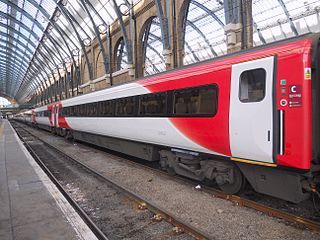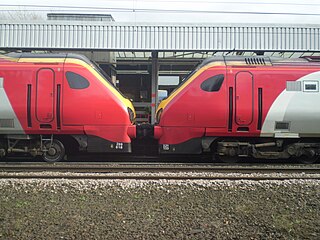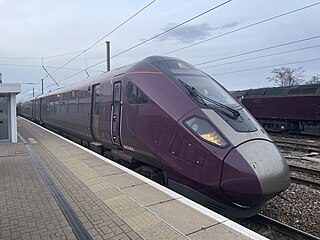| British Rail Class 180 Adelante | |
|---|---|
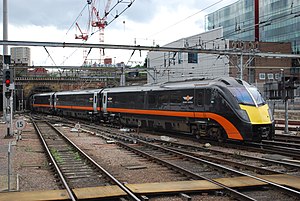 Grand Central Class 180 approaching London King's Cross in 2012 | |
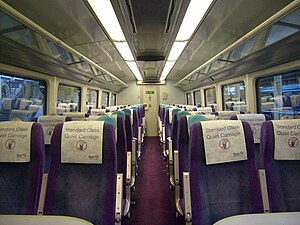 Original standard class interior | |
| In service | December 2001 – present |
| Manufacturer | Alstom |
| Built at | Washwood Heath |
| Family name | Alstom Coradia 1000 |
| Replaced | |
| Constructed | 2000–2001 |
| Number built | 14 sets |
| Number in service | 12 sets |
| Successor | |
| Formation | 5 cars per set |
| Fleet numbers | 180101–180114 |
| Capacity | 287 seats |
| Owners | Angel Trains |
| Operators | Grand Central |
| Specifications | |
| Car body construction | Steel [1] |
| Train length | 116.52 m (382 ft 3+3⁄8 in) |
| Car length | 23.71 or 23.03 m (77 ft 9+1⁄2 in or 75 ft 6+3⁄4 in) |
| Width | 2.73 m (8 ft 11+1⁄2 in) |
| Doors | TEBL electric single-leaf swing plug, two per side at the ends of each carriage |
| Maximum speed | 125 mph (200 km/h) |
| Weight | 252.5 tonnes (248.5 long tons; 278.3 short tons) (5-car set) [2] Axle load weight 13.25 tonnes |
| Prime mover(s) | Cummins QSK19-R [2] (one per car) |
| Engine type | Inline-6 turbo-diesel [3] |
| Displacement | 19 L (1,159 cu in) per engine [3] |
| Power output | 559 kW (750 hp) per engineat 2,100 rpm [4] |
| Transmission | Voith T 312 bre hydrokinetic [4] (one per car) |
| UIC classification | 2′B′+B′2′+B′2′+B′2′+B′2′ |
| Bogies | Alstom MB2 |
| Braking system(s) | Disc/Hydrodynamic [5] (Hydrodynamic brake unused in order to prevent the engines from overheating. [5] ) |
| Safety system(s) | AWS TPWS ATP ETCS(ETCS fitted but it won't be used until ETCS is installed on the East Coast Main line) [5] |
| Coupling system | Scharfenberg Type 330 [6] |
| Multiple working | Within type and Class 175 [2] |
| Track gauge | 1,435 mm (4 ft 8+1⁄2 in) standard gauge |
The British Rail Class 180 is a class of 14 diesel-hydraulic multiple unit passenger trains manufactured by Alstom at its Washwood Heath factory in 2000/01 for First Great Western (FGW). They are part of the Coradia 1000 family, along with the Class 175.
Contents
- Background
- Description
- Operations
- Current operators
- Former operators
- Aborted proposals
- Fleet details
- See also
- References
- External links
All Class 180s are owned by Angel Trains. Operations of the fleet commenced with FGW during December 2001, being tasked with express commuter services that used its 125 mph (200 km/h) capability. However, the type suffered frequent service disruptions due to recurring technical problems, particularly in regards to its hydraulic transmission system. FGW ultimately decided to return all of its Class 180s to the lessor in favour of refurbished InterCity 125 sets; the last train leaving its service in 2009. The Class 180s were held in storage for a time before new operators were secured.
During 2008, Hull Trains replaced its Class 222 fleet with several of the Class 180 sets; it operated the type through to 2020 until its replacement by Class 802 sets. Starting in 2009, Grand Central also leased several Class 180s; it operated the type exclusively until November 2023 when it introduced Class 221s onto some services. [7] Five Class 180 sets also returned to service with FGW; the operator's first refurbished unit was introduced on 28 May 2012. These five sets have since been transferred to Grand Central.
The four units formerly used by Hull Trains were transferred to East Midlands Railway, the first entering service in January 2020; these four units were withdrawn by East Midlands Railway in May 2023. Several proposed operators, such as First Harrogate Trains and Platinum Trains, also envisioned operating Class 180s; however, their track access applications were rejected by the Office of Road and Rail (ORR).












